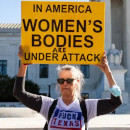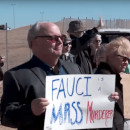 Trump & RFK, Jr Moving to Shut Down Medicare & Medicaid
Trump & RFK, Jr Moving to Shut Down Medicare & Medicaid
Associated Press - Sun Mar 9, 2025
WASHINGTON — Most of the 80,000 federal workers responsible for researching diseases, inspecting food and administering Medicare and Medicaid under the auspices of the Health and Human Services Department were emailed an offer to leave their job for as much as a $25,000 payment as part of President Donald Trump’s government cuts. More»
 Marjorie Taylor Greene Promotes “Measles Parties” for Kids Amid Deadly Outbreaks
Marjorie Taylor Greene Promotes “Measles Parties” for Kids Amid Deadly Outbreaks
AlterNet - Sun Mar 9, 2025
Measles can cause brain swelling and pneumonia. More»
 ‘It’s a Death Sentence’: US Health Insurance System is Failing, say Doctors
‘It’s a Death Sentence’: US Health Insurance System is Failing, say Doctors
The Guardian - Sun Jan 26, 2025
American doctors are accusing US health insurance giants of causing deadly delays to vital medical procedures and care – and putting profits ahead of their patients’ health. More»
 Highly Pathogenic Avian Influenza Confirmed in Commercial Poultry Flock in Georgia, All Poultry Activities in Georgia Suspended
Highly Pathogenic Avian Influenza Confirmed in Commercial Poultry Flock in Georgia, All Poultry Activities in Georgia Suspended
GA Department of Agriculture - Fri Jan 17, 2025
Today, the Georgia Department of Agriculture and the United States Department of Agriculture’s Animal and Plant Health Inspection Service confirmed a positive case of Highly Pathogenic Avian Influenza (HPAI) in a commercial poultry operation located in Elbert County, Georgia. More»
 Bird Flock Tests Positive for Bird Flu in Atlanta
Bird Flock Tests Positive for Bird Flu in Atlanta
WSB-TV - Mon Jan 13, 2025
CLAYTON COUNTY, Georgia — A case of avian influenza has been confirmed in a small backyard flock of birds in Georgia. More»
 How a Leading Chain of Psychiatric Hospitals Traps Patients
How a Leading Chain of Psychiatric Hospitals Traps Patients
New York Times - Sun Sep 1, 2024
Acadia Healthcare is one of America’s largest chains of psychiatric hospitals. More»
 Six More Deaths Linked to Boar’s Head Deli Meat Listeria Outbreak
Six More Deaths Linked to Boar’s Head Deli Meat Listeria Outbreak
NBC - Wed Aug 28, 2024
Six more people have died and more than a dozen sickened in a multistate listeria outbreak stemming from Boar’s Head deli meat, the Centers for Disease Control and Prevention said in an update Wednesday. More»
 Walmart Recalls Apple Juice Sold in 25 States due to Elevated Arsenic Levels
Walmart Recalls Apple Juice Sold in 25 States due to Elevated Arsenic Levels
Associated Press - Tue Aug 27, 2024
Walmart has recalled nearly 10,000 cases of apple juice sold in stores across the US that were found to contain potentially harmful levels of inorganic arsenic. More»
 The DEA plans to Reclassify Cannabis as a Schedule III Drug
The DEA plans to Reclassify Cannabis as a Schedule III Drug
The Guardian - Sun Jun 9, 2024
Recent rules proposed by the Drug Enforcement Administration aim to reclassify cannabis as a schedule III drug, raising an important question for the nearly 15,000 dispensaries in the US: what does this mean?
Cannabis, particularly cannabis containing delta-9 THC, occupies a bizarre legal gray area. More»
 Emergency rooms refused to treat pregnant women, leaving one to miscarry in a lobby restroom
Emergency rooms refused to treat pregnant women, leaving one to miscarry in a lobby restroom
Associated Press - Fri Apr 19, 2024
WASHINGTON — One woman miscarried in the restroom lobby of a Texas emergency room as front desk staff refused to admit her. More»
 New ‘Pirola’ variant of COVID is spreading fast, has experts concerned
New ‘Pirola’ variant of COVID is spreading fast, has experts concerned
New York Post - Fri Sep 1, 2023
As COVID-19 cases continue to rise nationwide, a new variant dubbed “Pirola” has experts worried. More»
 'Magic mushroom' Compound Creates a Hyper-connected Brain to Treat Depression
'Magic mushroom' Compound Creates a Hyper-connected Brain to Treat Depression
Live Science - Wed Apr 13, 2022
Psilocybin, the hallucinogenic compound found in "magic mushrooms," could treat depression by creating a hyper-connected brain. More»
 Texas Woman, 26, Charged with Murder Over ‘Self-Induced Abortion’
Texas Woman, 26, Charged with Murder Over ‘Self-Induced Abortion’
The Guardian - Sat Apr 9, 2022
A 26-year-old woman has been charged with murder in Texas after authorities said she caused “the death of an individual by self-induced abortion”, in a state that has the most restrictive abortion laws in the US. More»
 Georgia Hospital in ‘Immediate Jeopardy’ After Discharging Man Too Early
Georgia Hospital in ‘Immediate Jeopardy’ After Discharging Man Too Early
WGCL-TV - Tue Apr 5, 2022
CONYERS, GEORGIA - Jerry was found feet away from hospital property unconscious with tubes still sticking out of his body - His loved ones say he was discharged because his insurance ran out. More»
 FDA Removes 1,100 Dead Rodents From Arkansas Family Dollar Facility
FDA Removes 1,100 Dead Rodents From Arkansas Family Dollar Facility
Associated Press - Sat Feb 19, 2022
WEST MEMPHIS, Arkansas - More than 1,000 rodents were found inside a Family Dollar distribution facility in Arkansas, the US Food and Drug Administration said on Friday as the chain issued a voluntary recall on items purchased from hundreds of stores across the US south. More»
 Stop Using These Baby Formulas, the FDA Says, After 4 Infants Are Hospitalized, 1 Died
Stop Using These Baby Formulas, the FDA Says, After 4 Infants Are Hospitalized, 1 Died
NPR - Sat Feb 19, 2022
The US Food and Drug Administration is advising consumers not to use some powdered baby formulas after identifying four bacterial infections linked to the products. More»
 Oklahoma ICU Locks Down, Files Restraining Order Against Evangelical Church Leader
Oklahoma ICU Locks Down, Files Restraining Order Against Evangelical Church Leader
Daily Kos - Fri Feb 18, 2022
Mercy Hospital Oklahoma City has had to increase security, lock down their intensive care unit, and file a restraining order, all because of an Oklahoma church group that had been protesting the care and treatment of one of their members for COVID-19. More»
 US Department of Health ENDS Requirement for Hospitals to Report Daily COVID Deaths
US Department of Health ENDS Requirement for Hospitals to Report Daily COVID Deaths
Daily Mail - Sun Feb 6, 2022
The US Department of Health and Human Services (HHS) is no longer requiring hospital systems to report daily COVID-19 deaths to the federal government. More»
 Metro Atlanta Doctors Paint a Bleak Picture of Omicron's Toll
Metro Atlanta Doctors Paint a Bleak Picture of Omicron's Toll
Marietta Daily Journal - Sat Jan 22, 2022
As they did five months ago when the delta variant was ravaging Georgia, doctors from six of metro Atlantas largest healthcare providers joined forces Thursday to pull back the curtain on the toll omicron is now taking on their hospitals. More»
 Florida Health Official Put on Leave After Encouraging Staff to Get Covid Vaccine
Florida Health Official Put on Leave After Encouraging Staff to Get Covid Vaccine
The Guardian - Wed Jan 19, 2022
A health official who helped lead Florida’s response to the Covid-19 pandemic has been put on administrative leave as state officials investigate whether he tried to compel employees to get vaccinated. More»
 Desperate Hospitals Asking Covid Infected Staff to Return
Desperate Hospitals Asking Covid Infected Staff to Return
Politico - Mon Jan 17, 2022
Hospitals and long-term care facilities are so short staffed that many are compelling Covid-positive doctors and nurses to return to work, arguing that bringing back asymptomatic or even symptomatic staff is the only way they can keep their doors open amid a spike in hospitalizations. More»
 US COVID Hospitalizations Hit New Record High, Raising Risks for Patients
US COVID Hospitalizations Hit New Record High, Raising Risks for Patients
NPR - Tue Jan 11, 2022
The omicron-driven surge has sent COVID-19 hospitalizations skyrocketing across the US, reaching a new pandemic high this week with 145,982 patients hospitalized. More»
 Study Finds Cannabis Compounds Prevent Infection By Covid-19 Virus
Study Finds Cannabis Compounds Prevent Infection By Covid-19 Virus
Forbes - Tue Jan 11, 2022
Compounds in cannabis can prevent infection from the virus that causes Covid-19 by blocking its entry into cells, according to a study published this week by researchers affiliated with Oregon State University. More»
 New Year's Eve Knoxville Planned Parenthood fire is Ruled as Arson
New Year's Eve Knoxville Planned Parenthood fire is Ruled as Arson
NPR - Fri Jan 7, 2022
The New Years Eve fire that destroyed a Knoxville, Tennessee, Planned Parenthood building was intentionally set, investigators and officials have ruled. More»
 Infamous anti-vaxxer Marjorie Taylor Greene owns stock in the three major vaccine companies
Infamous anti-vaxxer Marjorie Taylor Greene owns stock in the three major vaccine companies
Daily Kos - Thu Dec 23, 2021
Perhaps it will come as no surprise to you that despite the fact that Republican Georgia Representative Marjorie Taylor Greene rails against the COVID-19 vaccine, she doesn’t mind making money from it. More»
 Massive Salad Recall for Salmonella, Listeria
Massive Salad Recall for Salmonella, Listeria
BGR - Wed Dec 22, 2021
If you’ve stocked up on salad ahead of the holidays, you should ensure that the products you’ve purchased have not been just recalled. More»
 A hospital offered a payment plan for baby's NICU stay — $45,843 a month for a year
A hospital offered a payment plan for baby's NICU stay — $45,843 a month for a year
NPR - Tue Dec 21, 2021
Close to midnight on November 12, 2020, Bisi Bennett was sitting on the couch in her pajamas and feeling uncomfortable. More»
 ‘A terrible tragedy’: US Passes 800,000 Covid Deaths – Highest in the World
‘A terrible tragedy’: US Passes 800,000 Covid Deaths – Highest in the World
The Guardian - Tue Dec 14, 2021
The US death toll from Covid-19 has passed 800,000, a once-unimaginable figure seen as doubly tragic given that more than 200,000 of those lives were lost after vaccines became available last spring. More»
 Omicron! Officials Confirm 5 Cases in NYC Metro Area
Omicron! Officials Confirm 5 Cases in NYC Metro Area
CNBC - Thu Dec 2, 2021
NEW YORK, New York - New York officials have confirmed five cases of the omicron Covid-19 variant in the New York City metropolitan area, Governor Kathy Hochul announced late Thursday, hours after cases were detected in Minnesota and Colorado. More»
 Fauci Says Omicron Variant Is Likely Already Here, NY Declares State of Emergency
Fauci Says Omicron Variant Is Likely Already Here, NY Declares State of Emergency
Daily Beast - Sat Nov 27, 2021
Parts of the US have begun an all-out assault against the new, highly transmissible Omicron variant of COVID-19 as Dr. More»
 Trump & RFK, Jr Moving to Shut Down Medicare & Medicaid
Trump & RFK, Jr Moving to Shut Down Medicare & Medicaid Marjorie Taylor Greene Promotes “Measles Parties” for Kids Amid Deadly Outbreaks
Marjorie Taylor Greene Promotes “Measles Parties” for Kids Amid Deadly Outbreaks ‘It’s a Death Sentence’: US Health Insurance System is Failing, say Doctors
‘It’s a Death Sentence’: US Health Insurance System is Failing, say Doctors Highly Pathogenic Avian Influenza Confirmed in Commercial Poultry Flock in Georgia, All Poultry Activities in Georgia Suspended
Highly Pathogenic Avian Influenza Confirmed in Commercial Poultry Flock in Georgia, All Poultry Activities in Georgia Suspended Bird Flock Tests Positive for Bird Flu in Atlanta
Bird Flock Tests Positive for Bird Flu in Atlanta How a Leading Chain of Psychiatric Hospitals Traps Patients
How a Leading Chain of Psychiatric Hospitals Traps Patients Six More Deaths Linked to Boar’s Head Deli Meat Listeria Outbreak
Six More Deaths Linked to Boar’s Head Deli Meat Listeria Outbreak Walmart Recalls Apple Juice Sold in 25 States due to Elevated Arsenic Levels
Walmart Recalls Apple Juice Sold in 25 States due to Elevated Arsenic Levels The DEA plans to Reclassify Cannabis as a Schedule III Drug
The DEA plans to Reclassify Cannabis as a Schedule III Drug Emergency rooms refused to treat pregnant women, leaving one to miscarry in a lobby restroom
Emergency rooms refused to treat pregnant women, leaving one to miscarry in a lobby restroom New ‘Pirola’ variant of COVID is spreading fast, has experts concerned
New ‘Pirola’ variant of COVID is spreading fast, has experts concerned 'Magic mushroom' Compound Creates a Hyper-connected Brain to Treat Depression
'Magic mushroom' Compound Creates a Hyper-connected Brain to Treat Depression Texas Woman, 26, Charged with Murder Over ‘Self-Induced Abortion’
Texas Woman, 26, Charged with Murder Over ‘Self-Induced Abortion’ Georgia Hospital in ‘Immediate Jeopardy’ After Discharging Man Too Early
Georgia Hospital in ‘Immediate Jeopardy’ After Discharging Man Too Early FDA Removes 1,100 Dead Rodents From Arkansas Family Dollar Facility
FDA Removes 1,100 Dead Rodents From Arkansas Family Dollar Facility Stop Using These Baby Formulas, the FDA Says, After 4 Infants Are Hospitalized, 1 Died
Stop Using These Baby Formulas, the FDA Says, After 4 Infants Are Hospitalized, 1 Died Oklahoma ICU Locks Down, Files Restraining Order Against Evangelical Church Leader
Oklahoma ICU Locks Down, Files Restraining Order Against Evangelical Church Leader US Department of Health ENDS Requirement for Hospitals to Report Daily COVID Deaths
US Department of Health ENDS Requirement for Hospitals to Report Daily COVID Deaths Metro Atlanta Doctors Paint a Bleak Picture of Omicron's Toll
Metro Atlanta Doctors Paint a Bleak Picture of Omicron's Toll Florida Health Official Put on Leave After Encouraging Staff to Get Covid Vaccine
Florida Health Official Put on Leave After Encouraging Staff to Get Covid Vaccine Desperate Hospitals Asking Covid Infected Staff to Return
Desperate Hospitals Asking Covid Infected Staff to Return US COVID Hospitalizations Hit New Record High, Raising Risks for Patients
US COVID Hospitalizations Hit New Record High, Raising Risks for Patients Study Finds Cannabis Compounds Prevent Infection By Covid-19 Virus
Study Finds Cannabis Compounds Prevent Infection By Covid-19 Virus New Year's Eve Knoxville Planned Parenthood fire is Ruled as Arson
New Year's Eve Knoxville Planned Parenthood fire is Ruled as Arson Infamous anti-vaxxer Marjorie Taylor Greene owns stock in the three major vaccine companies
Infamous anti-vaxxer Marjorie Taylor Greene owns stock in the three major vaccine companies Massive Salad Recall for Salmonella, Listeria
Massive Salad Recall for Salmonella, Listeria A hospital offered a payment plan for baby's NICU stay — $45,843 a month for a year
A hospital offered a payment plan for baby's NICU stay — $45,843 a month for a year ‘A terrible tragedy’: US Passes 800,000 Covid Deaths – Highest in the World
‘A terrible tragedy’: US Passes 800,000 Covid Deaths – Highest in the World Omicron! Officials Confirm 5 Cases in NYC Metro Area
Omicron! Officials Confirm 5 Cases in NYC Metro Area Fauci Says Omicron Variant Is Likely Already Here, NY Declares State of Emergency
Fauci Says Omicron Variant Is Likely Already Here, NY Declares State of Emergency


